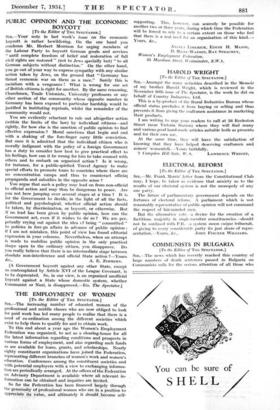PUBLIC OPINION AND THE ECONOMIC BOYCOTT [To the Editor of
THE SPECTATOR.] SIR,—Your note in last week's issue on the economic boycott is rather bewildering. On the one hand you condemn Mr. Herbert Morrison for urging members of the Labour Party to boycott German goods and services " until complete freedom of belief and restoration of full civil rights are restored " (not to Jews specially but) " to all German subjects without distinction." On the other hand, you go out of your way to express sympathy with any similar action taken by Jews, on the ground that " Germany has thrust economic war on them as a race." Surely this is racialism with a vengeance ! What is wrong for one set of British citizens is right for another. By the same reasoning, Churchmen, Trade Unionists, University professors or any other section of the community whose opposite number in Germany has been exposed to particular hardship would be justified in instituting reprisals, whilst the remainder of the community would not.
You are evidently reluctant to rule out altogether action (within the limits of the law) by individual citizens—and rightly, for how else is the sanction of public opinion to find effective expression ? Moral sanctions that begin and end with a shaking of the fore-finger carry little conviction. But once it is admitted that the individual citizen who is morally indignant with the policy of a foreign Government has a duty to consider how best to give practical effect to his feelings, how can it be wrong for him to take counsel with others and to embark on organized action ? Is it wrong, for instance, for a public-spirited Travel Agency to make special efforts to promote tours to countries where there are no concentration camps and thus to counteract official propaganda and subsidies in the opposite sense ?
You argue that such a policy may lead on from non-official to official action and may thus be dangerous to peace. Are you not here jumping over several stages at a time ? It is for the Government to decide, in the light of all the facts, political and psychological, whether official action should le taken, by discrimination, or boycott, or otherwise. But if no lead bas been given by • public opinion, how can the Government act, even if it wishes to do" 90 ? We are per- petually crying out against the idea cf being " committed " to policies in fore gn affairs in advance of public opinion : if I am not mistaken, this point of view has found editorial expression in your columns. Nevertheless, when an attempt is made to mobilize public opinion in the only practical shape open to the ordinary citizen, you disapprove. Do you really believe that there is no intermediate stage between absolute non-interference and official State action ?—Yours
[A Government boycott against any other State, except as contemplated by Article XVI of the League Covenant, is to be deprecated. So, in our view, is an organized unofficial boycott against a State whose domestic system, whether Communist or Nazi, is disapproved.—ED. The Spectator.]


















































 Previous page
Previous page